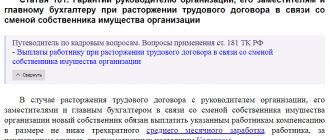Part four of Art. 81 of the Labor Code of the Russian Federation provides that in the event of termination of the activities of a branch, representative office or other separate structural unit of an organization located in another locality, the termination of employment contracts with employees of this unit is carried out according to the rules provided for cases of liquidation of the organization. What does this provision mean in practice? On what basis should employment contracts with employees of a separate structural unit be terminated? There is no clear answer to these questions. And the judicial practice in such cases, as it turned out, cannot be called uniform... But it is necessary to understand this complex problem, come to some kind of decision and follow it when it is necessary to dismiss the employees of the liquidated unit.
As is known, the liquidation of a structural unit of an organization reduces the number of employees, and therefore serves as a reason for the termination of employment contracts in connection with a reduction in the number of employees of the organization on the basis provided for in paragraph 2 of part 1 of Art. 81 Labor Code of the Russian Federation.
This is due to the fact that the structure of the organization consists of so-called structural units. Together, these units make up a single integrated system, formed by the employer for convenient and effective management. Each individual structural unit of an organization, for example a branch, representative office, department, department, workshop, site, is assigned a certain number of positions (professions, specialties). Employees occupying these positions must perform very specific tasks, including jointly with other structural units of the organization.
That is why carrying out measures aimed at changing the structure of the organization by adding new units, eliminating existing ones, or creating new structural units on the basis of existing ones is associated in a number of cases with the need to carry out measures to reduce the number of employees, which is often accompanied by a reduction in the number of personnel.
Making a decision to change the structure of the organization, including the creation of new divisions on the basis of abolished structural units, their abolition in the event of ineffective management of the labor process or their unprofitability, depends solely on the employer, who is endowed with the authority to organize the labor process at his own discretion. It is the employer, represented by the authorized body, who is responsible for the profitability of the enterprise and the implementation of tasks to achieve the goal set by the owners of the organization.
The Constitutional Court of the Russian Federation, in its ruling dated July 15, 2008 No. 413-О-О, formulated the constitutional and legal meaning of the norm provided for in paragraph 2 of part 1 of Art. 81 Labor Code of the Russian Federation.
Making a decision to change the structure, staffing table, number of employees of an organization falls within the exclusive competence of the employer, who has the right to terminate an employment contract with an employee due to a reduction in the number or staff of the organization’s employees, subject to compliance with the dismissal procedure established by the Labor Code of the Russian Federation and guarantees against arbitrary dismissal :
- preferential right to remain at work is given to employees with higher labor productivity and qualifications;
- Simultaneously with the warning of the upcoming dismissal, provided by the employer in writing at least two months before the dismissal, the employee must be offered another job available to the employer (vacant position).
Personnel Dictionary Structural subdivisions should be understood as branches, representative offices, departments, workshops, sections, etc., and by other locality - an area outside the administrative-territorial boundaries of the corresponding locality
The Supreme Court of the Russian Federation adheres to a similar point of view, and courts of general jurisdiction take the same position when considering labor disputes.
Among the structural divisions of the organization, it is necessary to distinguish separate structural divisions located in another area. Among them, the bulk are branches and representative offices.
In accordance with Part 4 of Art. 81 of the Labor Code of the Russian Federation, in the event of termination of the activities of a branch, representative office or other separate structural unit of an organization located in another locality, termination of employment contracts with employees of this unit is carried out according to the rules provided for cases of liquidation of the organization.
This is due to the fact that labor legislation provides additional guarantees for the rights of both the employee and the employer during the procedure for dismissing employees in connection with the liquidation of such units.
So, by virtue of Part 3 of Art. 81 of the Labor Code of the Russian Federation, dismissal on the grounds provided for in clause 2, part 1, art. 81 of the Labor Code of the Russian Federation, is allowed if it is impossible to transfer the employee with his written consent to another job available to the employer (both a vacant position or work corresponding to the employee’s qualifications, and a vacant lower position or lower paid job), which the employee can perform taking into account his state of health . In this case, the employer is obliged to offer the employee all vacancies available in the given area that meet the specified requirements. The employer is obliged to offer vacancies in other localities if this is provided for by the collective agreement, agreements, or employment contract.
The meaning of this norm is clear and does not raise any questions in practice, given that the concept of “another locality” is formulated in the Resolution of the Plenum of the Supreme Court of the Russian Federation dated March 17, 2004 No. 2 “On the application by the courts of the Russian Federation of the Labor Code of the Russian Federation.”
But the norm provided for in Part 4 of Art. 81 of the Labor Code of the Russian Federation, is not indisputable and is applied differently in practice by employers and courts of general jurisdiction.
TWO VIEWS ON THE PROBLEM
First point of view. In the event of liquidation of a separate structural unit located in another area, the dismissal of employees must occur on the grounds provided for in clause 1, part 1, art. 81 of the Labor Code of the Russian Federation, in compliance with the rules established by law in relation to dismissal in cases of liquidation of the organization as a whole. The argument for this statement is the provision of Part 4 of Art. 81 of the Labor Code of the Russian Federation, according to which the termination of employment contracts with employees of this unit is carried out according to the rules provided for cases of liquidation of an organization.
Considering that in the situation under consideration, the rules specific to the liquidation of an organization are subject to application, it is necessary not only to provide dismissed employees with the guarantees provided for cases of termination of the employment contract in connection with the liquidation of the organization, but also to indicate the basis for the dismissal of the employee, which entails the occurrence of rights to appropriate guarantees, i.e. the basis provided for in clause 1, part 1, art. 81 Labor Code of the Russian Federation.
Second point of view. The basis for termination of an employment contract in the event of liquidation of a separate structural unit may be a reduction in the organization's workforce, despite the presence of additional guarantees established by law for cases of abolition (liquidation) of structural units located in another location. The argument in this case is the argument that the presence of statutory deviations from the procedure established for general cases of termination of an employment contract due to staff reduction is not a reason for changing the grounds for termination of an employment contract.
Applying the norms of labor legislation in cases of liquidation of a structural unit located in another locality, employers, employees and courts of general jurisdiction interpret differently the norms of the Labor Code of the Russian Federation, which determine the features of termination of an employment contract with employees carrying out labor activities in the abolished separate structural units.
The unequal application of the above norms caused their contradictory interpretation by courts of general jurisdiction during the consideration and resolution of individual labor disputes, which was the result of contradictory judicial practice.
Dismissal due to division liquidation
Also, all employees whose dismissal is planned in a structural unit located in the same area as the main organization must be offered all vacant positions in the organization. All these guarantees directly follow from Art. 180 Labor Code of the Russian Federation.
Another important point is the right of the organization to dismiss an employee on maternity leave during the liquidation of a separate division. This right stems from the content of Part 6 of Art. 81 Labor Code of the Russian Federation.
180 of the Labor Code of the Russian Federation on the upcoming dismissal in connection with the termination of the branch’s activities in person and against signature at least two months before the dismissal.
The employer, with the written consent of the employee, has the right to terminate the employment contract with him before the expiration of the two-month period, paying him additional compensation in the amount of the employee’s average earnings, calculated in proportion to the time remaining before the expiration of the notice of dismissal. Also, the employer, in accordance with Part 1 of Art.
Its size is determined based on average monthly earnings; in addition, the employer is required to make payments for the period of employment. The maximum period is no more than two months from the date of dismissal. By decision of the territorial division of the employment service, the benefit may continue to be maintained.
We suggest you read: Dismissal due to staff reduction
This happens if the dismissed employee has not been employed by a government agency within 14 days. Accordingly, the citizen must register with the employment service. When carrying out the procedure for dismissing employees in connection with the liquidation of an enterprise, other legal reasons may be indicated with their consent.
Often employers prefer to terminate an employment contract on the following grounds:
- at your own request (Labor Code of the Russian Federation, Article 80 and Article 77, paragraph 3);
- in connection with a transfer to another company (Labor Code of the Russian Federation, Article 77, paragraph 5);
- by agreement of the parties (LC RF Art.
It is not necessary to obtain the consent of the employee, nor is it necessary to obtain special coordination of the issue with the trade union organization. The procedure for dismissal during liquidation of an organization: step-by-step instructions The procedure for dismissal due to termination of the employer’s activities includes the following steps:
- The adoption by the authorized body of a legal entity of a decision on the voluntary liquidation of an organization or the issuance of a court decision on forced liquidation.
- Appointment of a liquidator or creation of a liquidation commission.
- Preparing a liquidation plan is not a mandatory procedure, but is widely practiced to simplify and speed up all liquidation activities.
Thus, in order to terminate employment contracts with employees due to the termination of the activities of a branch, representative office or other separate structural unit of an institution located in another locality (dismissal during liquidation), it is necessary that this separate unit meet the above criteria, and in labor The contract with the employee indicated a specific separate structural unit and its address as the place of work.
It's fast, convenient and free! or by phone:
- Moscow and region: 7-499-350-97-04
- St. Petersburg and region: 7-812-309-87-91
- Federal ext. 149
Financial settlements with employees Payments to employees upon liquidation of an enterprise are a special topic for consideration. There is a special procedure for accrual and settlement, as well as several types of payments - basic and additional.
Basic calculations are everything that is due to the employee, regardless of dismissal and its grounds. This includes wages and other payments related to the performance of labor duties and compensation provided by law (bonuses, sick leave, maternity leave, travel allowance, etc.).
Compensation for unused vacation, calculated according to the number of days, is also subject to payment.
Forbidden
In accordance with the law, work books not received (not claimed) by employees are stored in the organization for at least 75 years. Taking into account the liquidation process, documents must be submitted to the territorial archive (state or municipal) upon completion of the activities.
- If an employee plans to register as unemployed, he will need documents that the employer is obliged to hand over. In addition to personnel documents, a certificate of average monthly salary for the last 3 months is required.
HOW ARE DISPUTES RESOLVED IN PRACTICE?
An analysis of modern judicial practice suggests that courts, when considering specific cases, do not attach much importance to the basis chosen by the employer for terminating an employment contract in the event of the liquidation of a separate division of the organization located in another locality, focusing on other points.
For example, according to the Judicial Collegium for Civil Cases of the Pskov Regional Court, when considering a labor dispute, the definition of a liquidated structural unit located in another area from the position of its isolation has legal significance. Depending on whether it is separate or cannot be classified in this category, the recognition of the termination of the employment contract as legal or illegal depended.
Attention Controversial decision
Thus, K., a 3rd category operator at gas station-62 of the Velikolukskaya Oil Depot branch of Pskovnefteprodukt LLC, was dismissed by order dated December 28, 2009 No. 0309K-348 in connection with the liquidation of a structural unit under clause 1 of part 1 of Art. 81 Labor Code of the Russian Federation. Considering her dismissal illegal, K. filed a lawsuit to reinstate her at work, pointing out, among other violations committed, in her opinion, by the employer, that the structural unit located in another area is not such, and this does not allow applying rules for terminating an employment contract provided for in Part 4 of Art. 81 Labor Code of the Russian Federation.
By the decision of the court of first instance, the plaintiff was denied reinstatement at work, since the abolished structural unit, located in another area (the village of Maksimovo, Shelkovsky volost, Velikoluksky district, Pskov region), was recognized as separate.
This conclusion of the court was based on the fact that gas station-62 was registered with the tax office, which is confirmed by the registration certificate, according to which the structural unit is located in another area, its property is the property of Pskovnefteprodukt LLC. In addition, the court took into account the inventory lists of fixed assets, work schedules and the training log of AZS-62.
The Judicial Collegium for Civil Cases of the Pskov Regional Court did not agree with this conclusion, arguing as follows.?
Since the Labor Code of the Russian Federation does not contain the concept of a separate structural unit, the court considers it necessary to be guided by the provisions of Art. 55 of the Civil Code of the Russian Federation, which contains characteristics common to branches and representative offices of a legal entity, which include the following:
- both represent the interests of the legal entity and protect them;
- both are endowed with the property of the legal entity that created them and act on the basis of the provisions approved by it;
- both have managers appointed by the legal entity and acting on the basis of its power of attorney;
- both are subject to indication in the constituent documents of the legal entity that created them.
The cassation court found the following.
1. The Charter of Pskovnefteprodukt LLC does not provide for such a separate structural unit as AZS-62.
2. According to the Company’s certificate submitted to the cassation court, there is no Regulation on AZS-62.
3. At AZS-62 there is no manager appointed by a legal entity and acting on the basis of his power of attorney. This circumstance is confirmed by local acts of the director of the Velikolukskaya Neftebaza branch, designated in the Charter of Pskovnefteprodukt LLC, who issued orders for appointment to the position, concluded employment contracts (including with the plaintiff), and approved the working hours of AZS-62.
4. According to the defendant’s staffing schedule, AZS-62 is assigned to the Velikolukskaya Oil Depot, a branch of Pskovnefteprodukt LLC. This circumstance is confirmed by the order of LLC Sales Association “Pskovnefteprodukt” dated October 27, 2009 No. 206, paragraph 2 of which ordered the director of the Velikolukskaya Oil Depot branch to submit an action plan to terminate the activities of the facilities, which included gas station-62.
5. The regulations on the branch of Pskovnefteprodukt LLC - Velikolukskaya Neftebaza - include the functions of transporting petroleum products to gas stations as its main activities; refueling vehicles from public gas stations and selling oils and lubricants in small packages at gas stations; carrying out, in accordance with the Rules for the operation of existing oil and gas facilities, gas stations their repair and reconstruction.
Taking into account the functions of Pskovnefteprodukt LLC and the functions of its branch Velikolukskaya Neftebaza, we can conclude that interests outside the location of the legal entity were carried out by the branch as a separate structural unit of Pskovnefteprodukt LLC.
6. According to clause 2.9 of the Branch Regulations, the relationship of the branch with other separate structural divisions of the Company is based on a contractual basis.
The court's reference to the fact that AZS-62 is registered for tax purposes has no legal significance for resolving the dispute, since the purpose of registering a separate structural unit with the tax authority is tax control, and not defining the structural unit of the organization as separate.
Based on the above, the conclusion of the trial court on the legality of K.’s dismissal on the grounds provided for in paragraph 1 of part 1 of Art. 81 of the Labor Code of the Russian Federation, does not correspond to the legally significant circumstances of the case and the requirements of the law. For this reason, the court decision was declared subject to cancellation.
Without dwelling in detail on the controversial nature of the above conclusion of the court of general jurisdiction, it should be noted that another basis for recognizing dismissal in connection with the liquidation of a separate structural unit located in another locality as legal was the presence of not one, but two or more separate structural units of the organization in one locality different from the location of the organization (legal entity). This allows (does not prevent) the employer from fulfilling the requirements of the law aimed at ensuring the employee’s right to work with a given employer, in the form of securing the employer’s obligation to employ an employee whose place of work has been abolished (liquidated, reduced).
Thus, G., assistant director of the Moscow territorial administration of JSC GSK Yugoria, by order dated March 22, 2010, was dismissed in connection with the liquidation of the organization on the grounds provided for in clause 1, part 1, art. 81 Labor Code of the Russian Federation. Not agreeing with the dismissal, she filed a lawsuit to reinstate her at work.
By decision of the Tverskoy District Court of Moscow dated July 1, 2010, her request for reinstatement was denied.
The argument for this court decision was the following.
Firstly, the court proceeded from the fact that the place of legal registration of the defendant is the Khanty-Mansiysk Okrug of Yugra, Khanty-Mansiysk, while the location of the structural unit in which the plaintiff worked is Moscow.
The basis for the dismissal of the plaintiff under clause 1, part 1, art. 81 of the Labor Code of the Russian Federation was served by the order dated December 29, 2009 of OJSC GSK Yugoria “On the liquidation of the Moscow territorial administration of OJSC GSK Yugoria and the transfer of affairs,” according to which the Moscow territorial administration of OJSC GSK Yugoria was subject to liquidation from 01.04.2010.
Since the reason for the decision to dismiss the plaintiff was the decision to liquidate a structural unit located in another area, the court of first instance came to the conclusion that the dismissal of the plaintiff under clause 1, part 1 of Art. 81 of the Labor Code of the Russian Federation in connection with the liquidation of a structural unit located in another area is legal.
Secondly, the court concluded that there were no violations in the actions of the defendant. According to the court of first instance, the established procedure for the dismissal of the plaintiff in connection with the liquidation of the enterprise, provided for by labor legislation, was not violated.
The plaintiff’s statements that she was not offered vacant positions, she was not transferred to another job, were not to be taken into account, since the offer of vacant positions, transfer to another position is not the responsibility of the defendant upon liquidation of the organization according to the current labor legislation.
In the opinion of the court, the plaintiff’s reference to the fact that after the liquidation of the Moscow territorial administration of JSC GSK “Yugoria” as a legal entity did not cease to operate, several other divisions continue to function, is also not a legal basis for satisfying the claim for reinstatement at work.
The Judicial Collegium for Civil Cases of the Moscow City Court, disagreeing with the indicated conclusions of the court, overturned the decision of the court of first instance regarding the refusal to satisfy the request for reinstatement at work. The basis for this decision was the following circumstances, which, in the opinion of the Judicial Panel, had legal significance for the case.
1. The cassation court proceeded, first of all, from the constitutional and legal meaning formulated by the Constitutional Court of the Russian Federation in the ruling of April 21, 2005 No. 144-O “On the refusal to accept for consideration the complaint of citizen Svetlana Vasilievna Permyakova about the violation of her constitutional rights by part four of Article 81 of the Labor Code of the Russian Federation."
The Constitutional Court of the Russian Federation, analyzing the meaning of the norm provided for in Part 4 of Art. 81 of the Labor Code of the Russian Federation, indicated the following.
Termination of an employment contract according to the rules provided for cases of liquidation of an organization is legal and justified, if the liquidation of a separate structural unit of the organization located in another locality is associated with the actual termination of the organization’s activities in that locality. This makes it impossible to transfer workers with their consent to another job in the same organization within the same area.
Consequently, among the circumstances of legal significance for this case, it is necessary to include those that confirm or refute the actual termination of the organization’s activities in Moscow, as well as the impossibility of transferring the plaintiff to another job with her consent in the same organization within the same same area.
2. In the cassation appeal and during the trial in the court of first instance, G. indicated that State Insurance OJSC did not cease its activities in Moscow. At the time of consideration of the case by the Judicial Collegium, several structural divisions of State Insurance OJSC were operating in Moscow, where she could have worked.
In violation of the requirements of Part 2 of Art. 12, part 2 art. 57 of the Code of Civil Procedure of the Russian Federation, the court of first instance did not check this circumstance; it did not clarify the question of the availability of employment opportunities for G. in the division of State Insurance OJSC in Moscow during the period of dismissal.
In such circumstances, the court decision regarding the refusal to satisfy the request for reinstatement at work is subject to cancellation and remand for a new trial in the same court for the following reasons.
In the situation under consideration, the court of first instance incorrectly determined and did not establish all the circumstances relevant to the case. In addition, violations established by the cassation instance of the court, committed by the court of first instance, cannot be corrected by the court of cassation, taking into account the need for additional clarification of the circumstances relevant to the case, with due respect for the procedural rights of the persons participating in the case.
Payments for dismissal of an employee upon liquidation of a unit
|Articles|Liquidation|Dismissal of employees during the liquidation of a branch
Your questions on the topic: 0
When a branch is liquidated, dismissal is a natural process: the company reduces turnover, the need for workers decreases.
One of the advantages of liquidating a separate division is that employees are dismissed within the minimum time frame stipulated by labor legislation, without regard to the need to complete work: they can be completed by employees of the head office.
So, how to fire employees when closing a branch and comply with the requirements of the Labor Code of the Russian Federation?
Branch employees are notified of upcoming dismissal due to liquidation two months in advance, with the last working day being the date preceding the beginning of the third month, even if it is a weekend or holiday.
This rule applies to those who work under an open-ended employment contract. Those who work only during certain seasons of the year are notified a week in advance. Those working under a fixed-term employment contract valid for less than two months are notified three days in advance.
If the organization has a trade union, it must be notified three months in advance. The employer has the right to increase this period.
The notice of dismissal due to liquidation must indicate:
- the basis for terminating the activities of a branch - usually a decision of the owners of the company, less often - a decision of an arbitration court (in this case, the entire enterprise is usually liquidated);
- date of upcoming dismissal;
- offering vacant positions in other branches of the company located in the same area.
It is very important: if the employer has other branches with open workplaces in the same area, he is obliged to offer these positions to employees dismissed due to the liquidation of a separate division.
However, the employer has no obligation to offer vacancies in another location.
The concept of locality depends on the terms of the employment contract and the hiring order: it can be Moscow and/or the Moscow region or the Central Federal District with all its regions.
Dismissal due to the liquidation of a unit implies termination of employment contracts with the absolute majority of employees. Such dismissal is a mass dismissal, and therefore it is necessary to additionally notify the employment center. The notice period is the same as for trade unions - three months.
The notification must contain information on the number of released labor by position and level of qualification, on the salaries of employees and the final date of dismissal.
All notifications are delivered to addressees by means of confirmation of receipt. This may be a signature on a copy of the notice that remains with the employer, or a signature on a notification of delivery of a registered letter with a description of the attachment.
The date of delivery must be indicated.
Early dismissal during liquidation of an enterprise is possible only on the initiative of the employee, but the employer also has the right to offer this on completely legal grounds.
In this case, the employee works less and loses almost nothing in material terms: he receives the average salary for the remaining days of the two-month notice period and a similar severance pay.
To calculate the amount of compensation for unused vacation, the actual time worked will be taken into account, so the loss will amount to up to five average daily payments.
We suggest you read: At what point is a person considered divorced?
By internal agreement of the parties or if such a right is included in the collective labor agreement, the length of the working week can be reduced for employees without reducing pay.
This can be one hour each working day or an hour on a certain day of the week: it is considered that workers receive additional time to look for a new job.
With a gradual decrease in workload, there is no damage to the organization, and if employees find work faster, there will be no need to pay them a second and third salary.
The employer is obliged to offer suitable vacancies during the entire period before the dismissal of employees.
On the last working day, the dismissed employee receives an order to terminate the employment contract against his signature. The order must contain all identifiers of the employment relationship:
- basis for occurrence - details of the parties (passport details of the employee, name of the employing company), information about the position of the employee and the person who issued the order, the date of conclusion and number of the employment contract;
- grounds for termination - the date and number of the dismissal order, the grounds for dismissal, the date of the dismissal itself.
The order is signed by the head of the organization and the dismissed employee, and the date of familiarization of the employee with the order is indicated.
The work book is also issued on the last working day, or on the next working day if the last day is a weekend. A delay in issuing a work book entails the employer’s obligation to pay the employee compensation proportional to the average income level, since the delay could become an obstacle to new employment or timely registration of unemployment benefits.
The entry in the work book in connection with the dismissal of liquidation includes the date of dismissal, the date and number of the dismissal order, an article of the labor code, the signatures of the employee and the authorized person, the date of review of the entry, and the company seal, if available.
Very important: employees must be fired on the day specified in the notice of liquidation of the enterprise. If they go to work for at least one extra day, they will have to be notified again in compliance with all deadlines. In the event that there is still a need for these employees, it is possible to conclude civil contracts with them.
On the last working day before dismissal due to the liquidation of a branch, employees are paid the balance of wages, severance pay and compensation for unused vacation. Those on maternity leave and those who were ill are also given temporary disability benefits.
Conclusion: termination of labor relations in the event of closing only a branch or the entire company as a whole has a similar structure.
The only difference is that when a branch is liquidated, situations may arise when dismissed employees will need to be offered open vacancies in other separate divisions.
- Labor Code of the Russian Federation dated December 30, 2001 No. 197-FZ.
Don't understand? Call (ext. 128) and come to the offices on Skhodnenskaya, 10, and on Nizhegorodskaya, 104/3. Legal specialists will definitely help you!
A special place among the grounds for dismissal at the initiative of the employer provided for in Part 1 of Art. 81 of the Labor Code of the Russian Federation, occupies dismissal due to the liquidation of an enterprise (organization, institution) or termination of activities by an individual entrepreneur. In a financial crisis, the most pressing issue for employees becomes the issue of dismissal due to downsizing or liquidation of the organization.
We invite you to familiarize yourself with: Sample message on concluding an employment contract with a former civil servant
Professional retraining program “Human Resource Management (Professional Standard)” Full-time distance professional retraining course of the National Union of Personnel Officers and Moscow Technological University (MIREA) in accordance with the requirements of the professional standard “Human Resources Management Specialist”.
In Russian business conditions, the procedure for closing enterprises is commonplace. Otherwise, closure is called liquidation and implies the termination of the economic activities of the enterprise.
The legislation distinguishes two main forms of liquidation: voluntary and forced. But in both cases, the entrepreneur will be required to comply with certain requirements and provide the necessary documents.
In answer to your question, it should be noted that the abolition of a department is not a reorganization of the organization. Reorganization is regulated by the norms of the Civil Code of the Russian Federation and can take place in the forms of merger, accession, division, separation, transformation (Clause 1 of Article 57 of the Civil Code of the Russian Federation). Regardless of the form of reorganization, labor relations with employees continue (Part.
5 tbsp. 75 Labor Code of the Russian Federation). From your question it follows that there is an order to make changes to the staffing table, therefore, the employer must comply with the procedure for reducing the number of employees of the organization provided for by law (Article 180 of the Labor Code of the Russian Federation)
1) by decision of the founders of the enterprise. Such a decision is made in connection with the termination of the enterprise’s activities, the achievement of its goal, or the court’s recognition of the invalidity of the registration.
2) by court decision. This may be due to carrying out activities without proper documents (license) or illegal activities. A liquidation demand may be sent to court by an authorized government body, for example a tax inspector, due to a violation of the procedure for submitting mandatory financial statements.
But this disorganization has a fairly strict order.
To make a decision to liquidate a department of an enterprise, its management must have clear justification for the need for restructuring. In addition, it is necessary to collect data on the state of all divisions and departments of the company, on the basis of which unprofitable and expendable departments will be determined.
Thus, the dissolution process, as a rule, does not affect the main departments of the enterprise, such as financial, production departments, sales department, etc.
Liquidation of a branch - dismissal of employees during its implementation will not cause difficulties if the grounds are correctly determined and all the guarantees required by the dismissed person are provided.
Read about this in the material below.
If a division of the company is liquidated, then the dismissal is carried out according to the rules established for cases of closure of the entire organization, but only if it is located in an area different from the location of the company’s head office (Part 4 of Article 81 of the Labor Code of the Russian Federation)
DISMISSAL ON THE GROUND PROVIDED IN P. 1, PART 1, ART. 81 Labor Code of the Russian Federation
Employers, terminating an employment contract with an employee under clause 1, part 1, art. 81 of the Labor Code of the Russian Federation, in the event of liquidation of a structural unit located in another locality, we proceed from the fact that the basis of the employment contract must be inextricably linked with the procedure for terminating the employment contract. At the same time, the provision of guarantees to the employee must correspond to the grounds on which he was dismissed from work.
Based on this position, the dismissal of employees is carried out on the basis provided for in paragraph 1 of Part 1 of Art. 81 of the Labor Code of the Russian Federation, - in connection with the liquidation of the organization. Courts of general jurisdiction recognize the dismissal of employees on this basis as legal and justified for the following reasons.
Attention Controversial decision
So, E.D., E.A., B., S. turned to the limited liability company "Mitsui Automotive CIS Investment B.V." with a statement declaring the dismissal illegal on the grounds provided for in paragraph 1 of Part 1 of Art. 81 Labor Code of the Russian Federation.
The reason for this statement was the lack of liquidation, which indicates the absence of a legal basis provided for by this rule, and allows us to assert that dismissal on this basis is illegal.
Meanwhile, the decision of the Presnensky District Court of Moscow rejected the claims. By the ruling of the Judicial Collegium for Civil Cases of the Moscow City Court, the above decision was left unchanged.
When considering the case, the court found that, in accordance with the concluded employment contracts, the plaintiffs were hired by the Moscow branch of the limited liability company Mitsui Automotive CIS Investment B.V.
By orders dated November 13, 2009, E.D., E.A., B., S. were dismissed under clause 1, part 1, art. 81 of the Labor Code of the Russian Federation in connection with the liquidation of the organization.
The basis for the dismissal of employees was the Company’s decision dated September 11, 2009 to liquidate the branch in Moscow.
By virtue of clause 7.3 of the Regulations on the branch of the Limited Liability Company "Mitsui Automotive CIS Investment B.V." its activities are terminated, including by decision of the Company’s board of directors to liquidate the branch.
According to the order dated September 11, 2009, based on the decision of the Company, the activities of the branch were suspended and the procedure for its liquidation began.
The fact of liquidation of the Company's branch in Moscow was confirmed by written evidence:
- information presented to the court by the State Registration Chamber under the Ministry of Justice of Russia, according to which information about the closure of a company branch was entered into the database of the state register of branches of foreign legal entities accredited on the territory of the Russian Federation;
- information letter of the Interdistrict Inspectorate of the Federal Tax Service No. 47 for Moscow dated May 11, 2010, from which it follows that the Company was deregistered at the location of the branch due to the termination of activities in the Russian Federation;
- by the decision of the director of branch No. 6 of the GU-MROFSS of the Russian Federation dated May 27, 2009;
- a certificate of deregistration of the insured organization with the Pension Fund of Russia.
When making its decision, the court was guided by the provisions of Part 4 of Art. 81 of the Labor Code of the Russian Federation and Part 8 of Art. 63 Civil Code of the Russian Federation.
According to Part 8 of Art. 63 of the Civil Code of the Russian Federation, the liquidation of a legal entity is considered completed, and the legal entity is considered to have ceased to exist after making an entry to this effect in the Unified State Register of Legal Entities.
The documents presented by the defendant, listed above, were found by the court to be sufficient to recognize the dismissal of employees under paragraph 1 of part 1 of Art. 81 of the Labor Code of the Russian Federation in connection with the liquidation of the organization is justified.
The plaintiffs' arguments that their dismissal was carried out in violation of the law, since the defendant continues to carry out his activities, the court rejected as contrary to the law and the provisions of Part 4 of Art. 81 Labor Code of the Russian Federation.
At the same time, the court noted that the continuation of the organization’s activities as a whole does not exclude the possibility of dismissal of employees under clause 1 of part 1 of Art. 81 of the Labor Code of the Russian Federation in connection with the termination of the activities of a branch of the organization.
The fact that the Moscow branch of the company was liquidated was reliably established by the court and confirmed by the case materials.
The plaintiffs’ reference to the fact that it was not the liquidation of the organization that occurred, but a reorganization by transferring jurisdiction to an affiliated legal entity that is part of the group, by creating the corresponding department in the affiliated Mitsui & Co. Moscow LLC, the court did not take into account.
The fact that some branch employees went to work for Mitsui & Co. Moscow LLC does not in itself confirm the fact of the reorganization.
Under such circumstances, the court concluded that there were no grounds for satisfying the claims to declare the dismissal illegal.
DISMISSAL ON THE GROUND PROVIDED FOR P. 2 PART 1 ART. 81 Labor Code of the Russian Federation
The application of this basis to the above cases is much less common.
When choosing this basis for dismissal, employers, as a rule, are guided by the provisions of clauses 1 and 4 of Art. taken together. 81 Labor Code of the Russian Federation.
The norm provided for in clause 1, part 1, art. 81 of the Labor Code of the Russian Federation, the liquidation of a separate structural unit located in another area is not considered a case that gives grounds for the dismissal of an employee. The norm provided for in Part 4 of Art. 81 of the Labor Code of the Russian Federation, does not contain grounds for applying clause 1, part 1, art. 81 of the Labor Code of the Russian Federation to cases of liquidation of a separate structural unit located in another area.
It is known that the abolition of a structural unit of an organization is mainly associated with a decrease in the number of employees, since the abolition (exclusion from the structure of the organization) of a structural unit is associated with the exclusion of staffing units assigned to this structure from the staffing table. Taking this into account, employers choose the basis for terminating an employment contract with employees who worked in a liquidated (abolished) structural unit, including a separate one located in another area, in the form of staff reduction (Clause 2, Part 1, Article 81 of the Labor Code of the Russian Federation).









